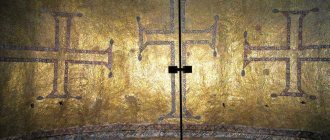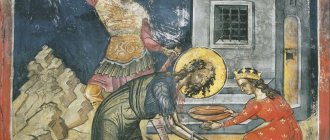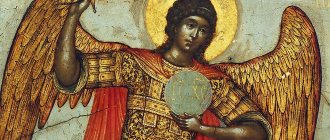The mother of the ruler of Byzantium, Constantine, as well as the king, can be considered one of the most famous people during the formation of Christianity in all centuries, and who were canonized along with the apostles.
Since ancient times, she and her son Constantine have been depicted in holy images as people who helped the formation and spread of Orthodoxy. She was known for the fact that thanks to her help, all the relics and relics were returned to true believers, and she contributed to the construction of cathedrals and monasteries. However, most of all she became known for her good deeds in the name of Jesus, the most important of which was the Exaltation of the Cross of the Lord.
Dear Brothers and Sisters, we will be very glad if you subscribe to our VKontakte group, there you will find even more prayers, icons and other interesting information, here is the address link - Orthodox group! We are also pleased to remind you that on the pages of our church store you can find all possible Orthodox goods!
The meaning of the icon of St. Helena
The main purpose of this icon is that every person who prays in front of it receives not only support and salvation, but also the strengthening of his faith, which is exactly what the asceticism bequeathed. This icon is a visual aid that everyone who believes in the Almighty is obliged to sincerely continue God’s work and bow before him.
In the divine image, the Great Martyr Helen is depicted together with her son Constantine, holding the Cross in her right hand. This sign symbolizes support and assistance in the formation of Orthodoxy and a symbol of the fact that Orthodoxy will never disappear, because as long as there are believers who keep the spirit of Orthodoxy in their hearts and souls with their hope and good deeds, and preach the word of the Lord, and the Word is eternal on earth. Dear Friends, we remind you that it is easy to buy an icon of Helen inexpensively on our pages, and you can also buy an icon named after the saint!
Day of Equal-to-the-Apostles Tsar Constantine and his mother Queen Helena
The Holy Emperor Constantine, who received the title Equal to the Apostles from the Church, and in world history was called the Great, was the son of Caesar Constantius Chlorus, who ruled the countries of Gaul and Britain.
The huge Roman Empire was at that time divided into Western and Eastern, headed by two independent emperors who had co-rulers, one of whom in the Western half was the father of Emperor Constantine.
Holy Queen Helen, mother of Emperor Constantine, was a Christian. The future ruler of the entire Roman Empire, Constantine, was raised to respect the Christian religion. His father did not persecute Christians in the countries he ruled, while throughout the rest of the Roman Empire Christians were subjected to severe persecution by the emperors Diocletian (284-305) and his co-ruler Maximian Galerius (305-311) - in the East and the emperor Maximian Herculus (284-305) - in the West.
After the death of Constantius Chlorus, his son Constantine was proclaimed Emperor of Gaul and Britain by his troops in 306. The first task of the new emperor was to proclaim freedom of professing the Christian faith in the countries under his control. The pagan fanatic Maximian Galerius in the East and the cruel tyrant Maxentius in the West hated Emperor Constantine and plotted to depose and kill him, but Constantine warned them and, with the help of God, defeated all his opponents in a series of wars. He prayed to God to give him a sign that would inspire his army to fight bravely, and the Lord showed him in the sky the shining sign of the Cross with the inscription “By this way conquer.”
Having become the sovereign ruler of the Western part of the Roman Empire, Constantine issued the Edict of Milan on religious tolerance in 313, and in 323, when he reigned as the sole emperor over the entire Roman Empire, he extended the Edict of Milan to the entire Eastern part of the empire. After three hundred years of persecution, Christians for the first time had the opportunity to openly confess their faith in Christ.
Having abandoned paganism, the emperor did not leave ancient Rome, which was the center of the pagan state, as the capital of the empire, but moved his capital to the east, where the city of Constantinople was founded. Constantine was deeply convinced that only the Christian religion could unite the huge, heterogeneous Roman Empire. He supported the Church in every possible way, brought back Christian confessors from exile, built churches, and took care of the clergy.
Deeply revering the Cross of the Lord, the emperor wanted to find the very Life-giving Cross on which our Lord Jesus Christ was crucified. For this purpose, he sent his mother, the holy queen Helen, to Jerusalem, giving her great powers and material resources. Together with Patriarch Macarius of Jerusalem, Saint Helena began a search, and by the Providence of God the Life-Giving Cross was miraculously found in 326.
While in Palestine, the holy queen did a lot for the benefit of the Church. She ordered to free all places associated with the earthly life of the Lord and His Most Pure Mother from all traces of paganism, and ordered the erection of Christian churches in these memorable places. Above the Cave of the Holy Sepulcher, Emperor Constantine himself ordered the construction of a magnificent temple in honor of the Resurrection of Christ. Saint Helena gave the Life-Giving Cross for safekeeping to the Patriarch, and took part of the Cross with her to present to the Emperor. Having distributed generous alms in Jerusalem and arranged meals for the poor, during which she herself served, Holy Queen Helena returned to Constantinople, where she soon died in 327.
For her great services to the Church and her labors in obtaining the Life-Giving Cross, Queen Helena is called Equal to the Apostles.
The peaceful existence of the Christian Church was disrupted by the sentiments and discord that arose within the Church due to the emerging heresies.
Even at the beginning of the activity of Emperor Constantine,
the heresy of the Donatists
and
Novatians arose in the West,
demanding the repetition of baptism over Christians who had fallen away during persecution. This heresy, rejected by two local councils, was finally condemned by the Council of Milan in 316.
One can be amazed at the deep church consciousness and feeling of Saint Constantine, who singled out the definition of “Consubstantial”, which he heard in the debates of the Council, and proposed to include this definition in the Creed.
After the Council of Nicea, Equal-to-the-Apostles Constantine continued his active work in favor of the Church. At the end of his life, he accepted holy baptism, having prepared for it with his whole life. Saint Constantine died on the day of Pentecost in 337, and was buried in the Church of the Holy Apostles, in a tomb he had prepared in advance.
What does the icon of St. Helena help with?
Among many Christian images, this icon has the greatest miraculous power and has one difference, which is that people are imprinted on it, became saints and are praised by believers. It was thanks to their thoughts and deeds that they became such, possessing the highest spirituality, which few people possessed at that time. This is the greatest Orthodox example of how a good deed in the name of the Lord turns into a road leading to immortality, because faith for people means everything: their strength, tenderness, devotion and confession.
A large number of believers turn to this image in our time to say their prayers for help and find strength to overcome obstacles and develop. An image can help in the following cases: • improve material well-being; • start a new and important business; • help in success in your career and climbing the career ladder; • achieving goals in the political sphere of life.
In addition, the icon is considered the heavenly protector of family and family relationships. This is the main reason for frequent prayer requests to the icon of St. Helena for saving the family, help in raising children (including their appearance - getting rid of the disease of infertility), softening the “sharp edges” in relationships, developing harmony, trusting relationships, and maintaining love.
This face is also highly revered by agricultural workers and ordinary Orthodox farmers. People believe that the Martyr can help reap a rich harvest and give fertility to the soil, which will bestow prosperity on everyone who has worked for the good.
The saint also helps in getting rid of illnesses and strengthening a person’s health, and a person’s physical state is closely related to the mental state, because people who want to heal the body must first heal the soul. And in this matter, the most important thing is faith, sincere and firm. Only she is the true path leading to the Most High mercy. The holy image of Equal to the Apostles Helen is a true masterpiece of Orthodoxy, the purpose of which cannot be overestimated.
Interpretation of the name Konstantin and what character the birthday boy has
The name Constantine is interpreted as permanent and is Latin in origin. As a child, a boy is often afraid of something and shows anxiety, but if he outgrows these qualities with the help of his parents, of course, then as he matures, he shows self-confidence. If he gives something away, he rarely demands the same actions towards himself.
He knows how to listen and hear, but always does everything his own way. He has a lot of patience and tact, but if he gets angry he will show himself to the fullest. Very often creative notes appear in it. Having matured, he is very kind to the female sex, but in a woman, first of all, he values her spirituality.
The text of the prayer to Saint Helena is:
“O most wonderful and most holy queen, holy Equal-to-the-Apostles Constantine and Helena! To you, quick defenders, we address our unworthy prayers, like a great mother who has the courage to turn to the Almighty. Ask the Lord for the kingdom of the Lord's temple and all people for blessings, for leaders justice, for priests to care for parishioners, for the faithful patience, for the elderly the desired peace, for the warriors courage, for women beauty, for the righteous holiness, for the child obedience, for the little ones the spirit of Orthodox teaching, for the weak deliverance, for those who quarrel, peace, for the offended humility, trembling before the Lord for offenders. To those who visit this church and offer prayers in it, God's parting words and to all believers the fulfillment of their requests, and we praise and glorify the Benefactor of all mankind, the Most High in the Life-Giving Trinity: the Father, and the Son, and the Holy Spirit, now and always and forever and ever. Amen."
What should I give this woman?
Typical Elena is a practical girl/woman who respects quality things. Therefore, giving her outright tinsel, that is, a bright, but cheap thing that will break tomorrow, is not the best idea.
Choose for her:
- something necessary that she is currently dreaming of (it’s not a big deal if it’s even a saucepan, but it’s exactly the volume and made of the material that is most relevant for her kitchen);
- a certificate to a good store for bed linen, expensive dishes, equipment (and the richer the choice there is, the more delighted the birthday girl will be);
- jewelry with a stone selected according to the zodiac sign of this woman (tell the store Elena’s date of birth, and the sellers will unmistakably select such a talisman - by the way, not only a large pendant, but also earrings or a ring will act as an amulet);
- catchy, but not capricious houseplant (Saintpaulia, pelargonium, azalea).
Don't hesitate to ask. But remember: sometimes women are embarrassed to ask for something expensive directly, preferring to gently hint.
So if Elena, as if by chance, starts talking about a tea set she saw in a store, asks you to evaluate a sample of a new French fragrance, or turns on an advertisement for sneakers, but does not say “buy”, do not hesitate - this is the very feminine hint that needs to be caught "between the lines".
What date is the day of the angel Elena and name day celebrated?
The very first date in the church calendar relating to the memory of the saint is the twenty-eighth of January. This day the venerable great martyr is revered; she is known for remaining steadfast in her adherence to the teachings of Christ, and she was sentenced to a painful death. If you look further, her memory days are celebrated in the spring. According to the church calendar, two days of remembrance are established in the spring - the third of March and the twenty-first of May. These dates were established by the Church as days of veneration of the Queen Equal to the Apostles, or Helen of Constantinople. The latter was not only the parent of the ruler of Rome Constantine, and she was involved in the spread of Christianity in the territory of Byzantium. She was also called a venerable because it was she who organized excavations in Jerusalem where they found the Life-Giving Cross, on which Jesus Christ was crucified. If you look further at the church calendar, you will see that in the summer there is a day of the same name Angel. When are they celebrated? Summer is a rich time for name days, because the church has established three dates for honoring the memory of the saints of the same name. And so the “summer” girls begin to celebrate the day of the angel on the eighth of June. On this day the memory of the Venerable Great Martyr, who was the daughter of the Venerable Father Alpheus, is honored. She was sentenced to death by stoning for her preaching Christian activities. Tenth of June. This day is considered the day of memory of Elena Diveevskaya (Manturova), who lived in a monastery and was engaged in education. She preached a rather modest lifestyle and spent most of her life in prayer. Abbot Seraphim of Sarov respected her very much and called her “the maid of honor of the Heavenly Lady” and promised that her holy remains would be freely available and kept in the Seraphim-Diveyevo monastery.
And the third date falls on the eleventh of July. On this day, the memory of the venerable righteous Olga is honored (she was baptized under the name Elena). Princess Olga severely punished the murderers of her husband (Prince Igor), after which she converted to the Christian faith and made quite a lot of effort to spread Orthodoxy in Rus'. It is Olga who is considered the “leader of Christianity” in Rus'.
However, not all names can boast of such an abundance of name days. Most of the names celebrate their name days only once or at most twice a year. However, it is not for nothing that her name is translated from Greek as “torch”. After all, having once chosen their path, these majestic girls reached it to the end, dying, but at the same time giving light to others. That is why the Reverend is mentioned very often in the church calendar.
Interpretation of the name Elena and what character the birthday girl has
Helen is a name of ancient Greek origin. Interpreted as the chosen one or sunlight. Elena celebrates her name day in ancient times in Rus' - representatives of the nobility had the right to bear this name and began naming their born daughters in 988. The name Elena itself has several variations - these are Alena, Olena, Elya. Everyone knows Elena the Beautiful, who lived during the times of Ancient Greece and who amazed many husbands with her beauty.
Little Elenas are able to dream and imagine themselves in a world of fairy tales with adventures and miracles. And if she is suddenly perceived differently, then the little girl Elena is capable of withdrawing into herself and withdrawing. In childhood, if someone suddenly offended her, she is capable of taking very cruel revenge on the offender. The older one is shy in unfamiliar company and is distinguished by exceptional kindness, but among familiar people she radically changes into a holiday person. Elena is a creative person and is often serious. And this seriousness remains throughout her life, and her cheerful disposition and playfulness manifests itself only in a good mood and among well-known people. Most often, Elena has a good ideal husband and the same children.
General information about Elena
Translated by Elena
Helen means bright in Greek. Parents try to give their child a good name so that his fate will be easy. Often, to choose a name, parents looked at the Orthodox calendar and, from the date of birth of the child, chose a name according to the calendar.
Meaning and talismans of the name
Girls with the beautiful name Elena have a mystery. We all grew up reading fairy tales and remember the image of the Beautiful Elena very well. In myths and legends it is shown to be of extraordinary beauty. But if you remember history, it was because of the beautiful Queen Helen that the Trojan Battle began.
If we talk about name talismans, then according to the church calendar Elena has these:
- - Mercury is the patron planet;
- - Gemini - zodiac sign;
- - color - yellow, green and scarlet;
- - stone - chalcedony;
- - plant - orchid;
- - animal - deer.
The main character traits of Helen according to the Orthodox calendar
Kindness
Lena's distinctive feature is her kindness. From an early age you can immediately understand who this beautiful girl will grow up to be. He loves animals and tries to help them in every possible way. Growing up, little Helen is drawn to creativity. She begins to try herself in embroidery, knitting and drawing. He studies well at school, thanks to his phenomenal memory and love of exact sciences.
Hardness
The older Lena gets, the stronger her character. But in some life situations this girl is very vulnerable and sensitive. If you don't know Lena very well, you may think that she is a quiet and reserved person. But that's not true.
In fact, this girl is the life of the party, a great inventor and virtuoso. For Len, the most important thing in life is communication. If she is left alone, she may get sick. As she gets older, Lena will punish everyone with her attractiveness. She has many fans and admirers. Money doesn't matter to her; if she likes a man, she will marry him, no matter what.
Marriage
Elena doesn’t really like to do the cleaning, so her husband will most likely do all the housework. The key moment in Lenochka’s life will be a successful marriage. If everything goes well, she will become the happiest woman. In Lena's marriage, they value devotion and fidelity. They are excellent mothers and reliable wives.
Career
He prefers to look for work in areas such as:
- — pedagogy;
- - the science;
- - preschool education;
- - school education;
- — trade;
- - administration.
She is responsible and attentive in her work. He is not afraid of difficulties and always achieves his goal.
In addition to excavations, Elena was involved in charity work and construction. Under her leadership, schools, hospitals and churches were built. Elena bought out the debts of debtors and forgave them, and released prisoners from prison. The great Helen died in 330.
Rituals on Helen's Day
Despite the fact that according to custom, men sowed flax on June 3, women also played an important role. In particular, they performed special rituals that were designed to increase harvest and luck.
On the day before Olena-Flax, women gathered in a separate hut and each brought two eggs with them. They were baked in the oven and then placed in bags with flax seeds. This had to be done so that no one would notice, otherwise the evil eye could not be avoided.
In the morning, the men took sacks and went to the field to sow flax. However, before that, each of them threw the eggs as high as possible. If someone succeeded better than anyone, then he could count on the richest harvest.
The shells of these eggs were not thrown away, but were always brought home. It was ground into powder and fed to chickens to help them lay eggs better.
Another ritual, which was held on June 3, was also associated with the sowing of flax. Women went out into the field and completely took off their clothes. They believed that flax would see them naked, take pity on them and give them everything they needed so that they could sew themselves a shirt.
There was even a corresponding saying, which was attributed to flax: “This woman is poor - she doesn’t even have a shirt on her body, you’ll have to take pity on her and do better.”









